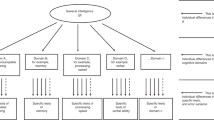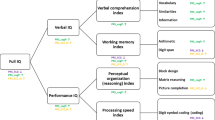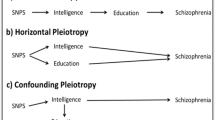Abstract
Anecdotal and biographical reports have long suggested that bipolar disorder is more common in people with exceptional cognitive or creative ability. Epidemiological evidence for such a link is sparse. We investigated the relationship between intelligence and subsequent risk of hospitalisation for bipolar disorder in a prospective cohort study of 1 049 607 Swedish men. Intelligence was measured on conscription for military service at a mean age of 18.3 years and data on psychiatric hospital admissions over a mean follow-up period of 22.6 years was obtained from national records. Risk of hospitalisation with any form of bipolar disorder fell in a stepwise manner as intelligence increased (P for linear trend <0.0001). However, when we restricted analyses to men with no psychiatric comorbidity, there was a ‘reversed-J’ shaped association: men with the lowest intelligence had the greatest risk of being admitted with pure bipolar disorder, but risk was also elevated among men with the highest intelligence (P for quadratic trend=0.03), primarily in those with the highest verbal (P for quadratic trend=0.009) or technical ability (P for quadratic trend <0.0001). At least in men, high intelligence may indeed be a risk factor for bipolar disorder, but only in the minority of cases who have the disorder in a pure form with no psychiatric comorbidity.
This is a preview of subscription content, access via your institution
Access options
Subscribe to this journal
Receive 12 print issues and online access
$259.00 per year
only $21.58 per issue
Buy this article
- Purchase on Springer Link
- Instant access to full article PDF
Prices may be subject to local taxes which are calculated during checkout



Similar content being viewed by others
References
Jamison KR . Manic-depressive illness and creativity. Sci Am 1995; 272: 62–67.
Nettle D . Strong Imagination: Madness, Creativity and Human Nature. Oxford University Press : Oxford, 2001.
Koenen KC, Moffitt TE, Roberts AL, Martin LT, Kubzansky L, Harrington H et al. Childhood IQ and adult mental disorders: a test of the cognitive reserve hypothesis. Am J Psychiatry 2009; 166: 50–57.
MacCabe JH, Lambe MP, Cnattingius S, Sham PC, David AS, Reichenberg A et al. Excellent school performance at age 16 and risk of adult bipolar disorder: national cohort study. Br J Psychiatry 2010; 196: 109–115.
Zammit S, Allebeck P, David AS, Dalman C, Hemmingsson T, Lundberg I et al. A longitudinal study of premorbid IQ Score and risk of developing schizophrenia, bipolar disorder, severe depression, and other nonaffective psychoses. Arch Gen Psychiatry 2004; 61: 354–360.
Gale CR, Deary IJ, Boyle SH, Barefoot J, Mortensen LH, Batty GD . Cognitive ability in early adulthood and risk of 5 specific psychiatric disorders in middle age: the vietnam experience study. Arch Gen Psychiatry 2008; 65: 1410–1418.
Gale CR, Batty GD, Tynelius P, Deary IJ, Rasmussen F . Intelligence in early adulthood and subsequent hospitalization for mental disorders. Epidemiology 2010; 21: 70–77.
Gunnell D, Magnusson PK, Rasmussen F . Low intelligence test scores in 18 year old men and risk of suicide: cohort study. BMJ 2005; 330: 167.
Carlstedt B, Mardberg B . Construct-validity of the swedish enlistment battery. Scand J Psychol 1993; 34: 353–362.
Carlstedt B . Cognitive abilities - aspects of structure, process and measurement University of Gothenburg: Gothenburg, 2000.
Epidemiologiskt Centrum S. Patientregistret. Utskrivningar från sluten vård 1964–2005. Kvalitet och innehåll. Socialstyrelsen: Stockholm, 2006.
Sellgren C, Landen M, Lichtenstein P, Hultman CM, Langstrom N . Validity of bipolar disorder hospital discharge diagnoses: file review and multiple register linkage in Sweden. Acta Psychiatr Scand 2011; 124: 447–453.
Ludvigsson JF, Andersson E, Ekbom A, Feychting M, Kim JL, Reuterwall C et al. External review and validation of the Swedish national inpatient register. BMC Public Health 2011; 11: 450.
Ekholm B, Ekholm A, Adolfsson R, Vares M, Osby U, Sedvall GC et al. Evaluation of diagnostic procedures in Swedish patients with schizophrenia and related psychoses. Nord J Psychiatry 2005; 59: 457–464.
Dalman C, Broms J, Cullberg J, Allebeck P . Young cases of schizophrenia identified in a national inpatient register--are the diagnoses valid? Soc Psychiatry Psychiatr Epidemiol 2002; 37: 527–531.
Glahn DC, Almasy L, Barguil M, Hare E, Peralta JM, Kent JW et al. Neurocognitive endophenotypes for bipolar disorder identified in multiplex multigenerational families. Arch Gen Psychiatry 2010; 67: 168–177.
Pepe MS, Janes H, Longton G, Leisenring W, Newcomb P. Limitations of the odds ratio in gauging the performance of a diagnostic, prognostic, or screening marker. Am J Epidemiol 2004; 159: 882–890.
Acknowledgements
This work was conducted in The University of Edinburgh Centre for Cognitive Ageing and Cognitive Epidemiology which is supported by the Biotechnology and Biological Sciences Research Council, the Economic and Social Research Council, the Engineering and Physical Sciences Research Council and the Medical Research Council, as part of the Lifelong Health and Wellbeing Initiative (G0700704/84698). David Batty is a UK Wellcome Trust Fellow. Finn Rasmussen is supported by the Swedish Council for Working Life and Social Research. The study sponsors had no role in the study design, the collection of data, or in the preparation of this manuscript.
Author information
Authors and Affiliations
Corresponding authors
Ethics declarations
Competing interests
The authors declare no conflict of interest.
Additional information
Supplementary Information accompanies the paper on the Molecular Psychiatry website
Supplementary information
Rights and permissions
About this article
Cite this article
Gale, C., Batty, G., McIntosh, A. et al. Is bipolar disorder more common in highly intelligent people? A cohort study of a million men. Mol Psychiatry 18, 190–194 (2013). https://doi.org/10.1038/mp.2012.26
Received:
Revised:
Accepted:
Published:
Issue Date:
DOI: https://doi.org/10.1038/mp.2012.26
Keywords
This article is cited by
-
Microglia and cognitive impairment in schizophrenia: translating scientific progress into novel therapeutic interventions
Schizophrenia (2023)
-
Correlates of neurological soft signs in bipolar disorder
European Archives of Psychiatry and Clinical Neuroscience (2023)
-
Bidirectional genetic overlap between bipolar disorder and intelligence
BMC Medicine (2022)
-
Herpes simplex virus 1 infection on grey matter and general intelligence in severe mental illness
Translational Psychiatry (2022)
-
Genome-wide analysis reveals extensive genetic overlap between schizophrenia, bipolar disorder, and intelligence
Molecular Psychiatry (2020)



